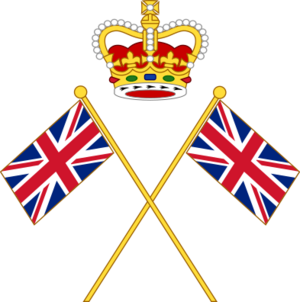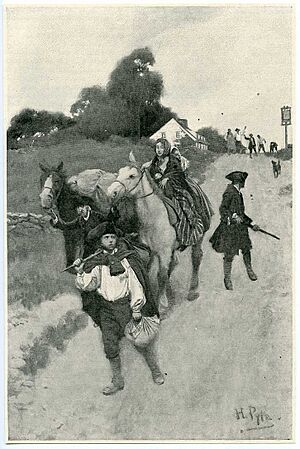Loyalism facts for kids
Loyalism means being very loyal to the United Kingdom or the British King or Queen. This idea has been important in the UK and its former colonies, like Canada and Australia.
In North America, the term "Loyalist" often refers to people who stayed loyal to Britain during the American Revolution. These Loyalists did not want to break away from British rule. Many of them later moved to other British colonies, especially in what is now Canada. They are often called United Empire Loyalists.
Contents
History of Loyalism
Loyalists in North America
The American Revolution
During the American Revolution, some colonists in North America chose to stay loyal to the British King. These people were called Loyalists. They did not support the idea of the colonies becoming independent.
Many different kinds of people were Loyalists. Some were British officials or church leaders. Others were rich business owners who had strong ties to London. There were also former British soldiers and new arrivals, especially from Scotland. Many ordinary colonists were also Loyalists because they were naturally conservative or felt they needed Britain's protection.
About 15% to 20% of the white colonists were Loyalists. In comparison, about 40% to 50% were "Patriots" who wanted independence. The rest were neutral. Because so many people had strong feelings on both sides, some historians say the American Revolution was like a civil war as much as a fight for independence.
The British army hoped to get a lot of help from Loyalist soldiers during the war. More than 100 Loyalist regiments were formed, with thousands of soldiers fighting for Britain. The Patriots tried to stop Loyalism by taking away property from active Loyalists, forcing many to leave.
After the war, most Loyalists (about 80-90%) stayed in the new United States. They learned to live in the new country, which was now a republic.
Loyalists Move to New Homes
Around 62,000 Loyalists left the United States by 1784. Almost 50,000 of them found new homes in other British colonies in North America. These included Quebec (which later became Ontario and Quebec), New Brunswick, Nova Scotia, and Prince Edward Island. Others went to places like Jamaica, the Bahamas, and Britain. The British government often helped them financially.
Later, about 30,000 more "Late Loyalists" moved to Ontario in the 1790s. The British government invited them, offering land and low taxes if they swore loyalty to the King. This brought the total number of new settlers to over 70,000.
Among these Loyalists were Native American groups, like the Mohawk leader Joseph Brant. There were also "Black Loyalists," who were formerly enslaved people who joined the British side to gain their freedom. Some Mennonites were also Loyalists.
These Loyalists helped build modern English-speaking Canada. Many of their descendants today still use the special title "UEL" (meaning United Empire Loyalist). Whether for strong beliefs or hopes for a better life, all Loyalists supported the British Crown and Empire.
Loyalism in Ireland
The word "Loyalist" was first used in Ireland in the 1790s. It described Protestant Irish people who were against giving more rights to Catholics (called Catholic emancipation) and against Ireland becoming independent from Britain.
During the Irish Rebellion of 1798, the term "ultra loyalist" was used for those strongly against the United Irishmen, who wanted an independent Irish Republic. In 1795, Ulster loyalists formed the Orange Order. This group helped put down the rebellion.
Loyalism in Australia
In 1804, Loyalist Associations were formed in Sydney and Parramatta, Australia. Each had about 50 members. They were created to oppose radical groups and later helped stop the Castle Hill convict rebellion.
Loyalism in England and Wales
In the early 1800s, many counties in England and Wales formed Loyalist Associations of Workers. They wanted to stop what they saw as a threat from radical groups. The first such group started in Westminster in 1792.
Modern Loyalism
Loyalism in Northern Ireland
Today, in Northern Ireland, "Loyalist" usually means someone who strongly opposes Irish republicanism. This often includes being against Roman Catholicism. Loyalists in Northern Ireland emphasize their Ulster Protestant identity. They celebrate their own heroes and events, like the bravery of the 36th (Ulster) Division in World War I and the activities of the Orange Order.
An Ulster loyalist is usually a unionist. This means they strongly support Northern Ireland remaining part of the United Kingdom. Some might even support an independent Northern Ireland. In recent times, the term has also been used for several Loyalist paramilitary groups, such as the Ulster Defence Association (UDA) and the Ulster Volunteer Force (UVF).
Even though these groups claim to speak for their communities, they have very little support in elections. Their support mainly comes from working-class areas in cities. The Progressive Unionist Party, a Loyalist political party, won some seats in the Northern Ireland Assembly in the past, but lost them in 2011.
Loyalism in the Republic of Ireland
After Ireland became independent and was divided, Loyalism in the Republic of Ireland has become much less common. Many southern Irish Loyalists joined the British military in World War I and World War II. Many of them died or moved to the United Kingdom after the wars. The division of Ireland also led many southern Loyalists to move to Northern Ireland or Britain. However, a few small Loyalist groups are still active.
Loyalism in Scotland
The Loyalist movement in Scotland began when many Ulster Protestants moved there from Ireland during the Industrial Revolution. In Scotland, a Loyalist is someone who supports Scottish unionism, but often focuses more on the issue of Irish union.
Scottish Loyalism often involves strong opposition to Irish republicanism, Scottish independence, and the Roman Catholic Church. This is especially true regarding Catholic schools.
Scottish Loyalism has become more noticeable since the Scottish Parliament was created. You can see it at Orange parades, with supporters from football clubs like Rangers. Most Loyalists in Scotland live in small working-class areas in major cities or industrial towns, such as Glasgow and Edinburgh. There are fewer Loyalists in areas like Aberdeen or the Scottish Highlands.
 | William Lucy |
 | Charles Hayes |
 | Cleveland Robinson |



